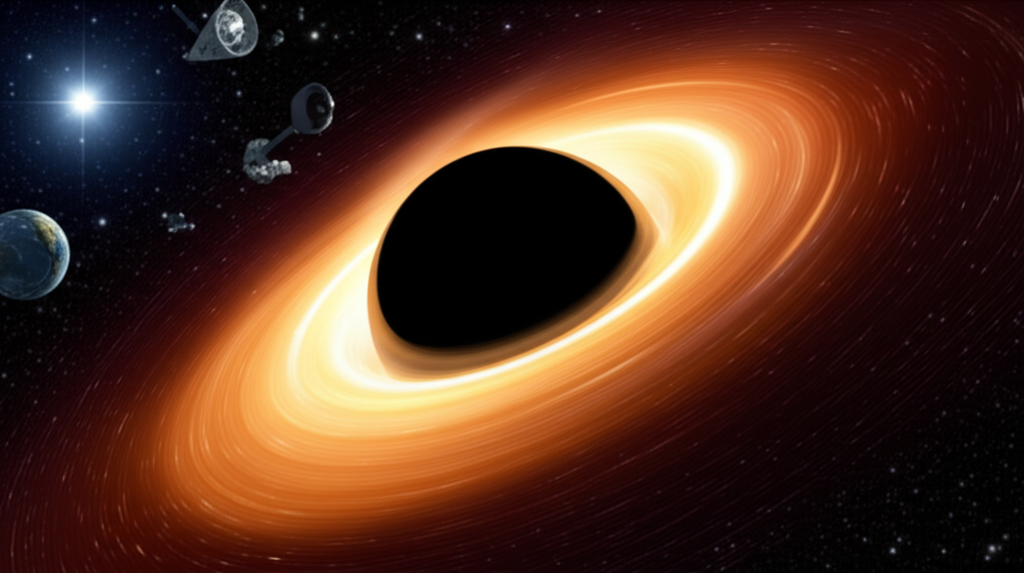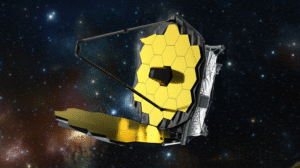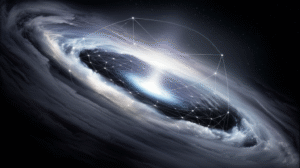Black Holes: Gateways or Graveyards?
Explore the mysteries of black holes and wormholes — from formation to theories of interstellar travel and quantum singularities. A deep dive into cosmic enigmas.

Introduction: The Cosmic Enigma of Black Holes
Black holes captivate scientists and the public alike. Their mysterious nature sparks endless questions. Are they wormholes to another universe or cosmic dead ends? This article explores their secrets. We delve into what makes black holes so intriguing. Also, we examine the possibilities they present. From their formation to their potential as gateways, no stone is left unturned. Join us on this journey through space’s most enigmatic phenomena.
Understanding Black Holes
The Birth of a Black Hole
Stars evolve over millions to billions of years. Eventually, massive stars exhaust their nuclear fuel. This leads to a catastrophic collapse. The collapse triggers a supernova. The supernova explosion can leave behind a dense core. If this core is sufficiently massive, it becomes a black hole.
Supernovae play a crucial role. They scatter elements across the cosmos. They also mark the birth of black holes. Not all supernovae create black holes. Only the most massive stars do.
The Anatomy of a Black Hole
Event Horizon: This is the boundary around a black hole. Once anything crosses it, escape is impossible. Not even light can break free from its grip.
Singularity: At the center lies the singularity. It’s where matter is infinitely dense. The laws of physics as we know them break down here.
Wormholes: Theoretical Passages Through Space and Time
The Einstein-Rosen Bridge
The Einstein-Rosen bridge, a solution to the equations of general relativity, suggests wormholes could exist. This theory implies that space-time might fold, creating shortcuts across the universe. However, these bridges are highly unstable without exotic matter.
The Possibility of Traversable Wormholes
For a wormhole to be traversable, it must remain open long enough for something to pass through. Scientists speculate that negative energy or exotic matter could stabilize a wormhole. Yet, the concept remains purely theoretical with no empirical evidence.
The Role of Exotic Matter
Exotic matter, which defies normal physical laws, could theoretically keep a wormhole open. It possesses negative energy density, a property not observed in known matter. Current science cannot produce or confirm the existence of such matter, limiting wormhole research.
The Scientific Quest to Understand Black Holes and Wormholes
Observational Challenges
Directly observing black holes and wormholes presents significant difficulties. Their nature absorbs light, making them invisible to traditional telescopes. However, scientists detect them through their effects on nearby matter and light. Recent technological advancements, like the Event Horizon Telescope, have improved our ability to study these phenomena. These tools capture images of black holes’ shadows, offering new insights.
Theoretical Models and Simulations
Scientists rely on theoretical models and simulations to study black holes and wormholes. These models help predict behavior and interactions with surrounding space. Despite their usefulness, current simulations face limitations. They often cannot fully replicate the extreme conditions near black holes. This gap highlights the need for more advanced technology and theories.
Black Holes and Wormholes in Popular Culture
Science fiction has shaped how many view black holes and wormholes. Movies and books often depict them as gateways to other universes. However, these portrayals usually stretch scientific facts. For instance, traversing a wormhole safely remains a theoretical concept.
Comparing fiction to reality reveals big differences. Fictional stories ignore the deadly forces near black holes. They also skip the complex physics governing wormholes. Yet, these creative liberties help spark public interest in astrophysics.
Despite inaccuracies, sci-fi plays a key role in science communication. It makes complex ideas more accessible. Moreover, it encourages curiosity about the universe’s mysteries. Thus, while not entirely accurate, these portrayals have value.
The Future of Cosmic Research
Emerging Technologies and Missions
Scientists plan to launch advanced telescopes soon. These tools will study black holes more closely. Space missions, like the James Webb Space Telescope, aim to uncover secrets. New discoveries could change our understanding of the universe.
The Search for Wormholes
Researchers use both theory and observation to find wormholes. They analyze light patterns and gravitational waves. Finding a wormhole would prove Einstein’s theories. It could also open doors to interstellar travel.
Expert Insights
Leading researchers offer diverse perspectives on black holes and wormholes. Some argue black holes could be wormholes to other universes. Others see them as cosmic dead ends. Studies suggest wormholes might allow travel through spacetime. Yet, evidence remains theoretical. Experts agree more research is needed to understand these phenomena fully. Their insights highlight the complexity and mystery of the universe.
Conclusion: The Unending Quest for Knowledge
Black holes challenge our understanding of the universe. They might be wormholes to another universe or cosmic dead ends. Yet, many mysteries remain unsolved.
Continued research is crucial. It pushes the boundaries of our knowledge. Every discovery brings new questions.
Exploration drives progress. Scientists worldwide collaborate to unravel these cosmic puzzles. Their work inspires future generations.
The quest for knowledge never ends. It fuels our curiosity and expands our horizons. Black holes symbolize this endless journey.
Citations
- Theoretical Foundations of Wormholes: Explores the mathematical underpinnings and physics theories supporting wormholes.
- Observational Evidence of Black Holes: Details the astronomical observations that confirm black holes’ existence.
- The Role of Exotic Matter in Wormhole Stability: Discusses how exotic matter could theoretically stabilize wormholes.
- Future Technologies in Cosmic Research: Highlights emerging technologies that may unlock new cosmic discoveries.
-









Black holes and wormholes are truly fascinating phenomena that push the boundaries of our understanding of the universe. The idea that massive stars can collapse into black holes, creating such intense gravitational fields that not even light can escape, is both awe-inspiring and terrifying. The concept of wormholes, as suggested by the Einstein-Rosen bridge, opens up possibilities for shortcuts across the cosmos, though it remains purely theoretical for now. It’s incredible how science fiction has popularized these ideas, even if they often take creative liberties with the science. I wonder, though, if we’ll ever find empirical evidence to support the existence of traversable wormholes. What do you think—could exotic matter or negative energy ever be harnessed to stabilize them? And how do you feel about the role of sci-fi in shaping our curiosity about these cosmic mysteries?
The evolution of stars and the formation of black holes are truly fascinating processes. Supernovae not only mark the end of massive stars but also play a vital role in distributing elements across the universe. The idea of wormholes, as suggested by the Einstein-Rosen bridge, is intriguing, though it remains purely theoretical. It’s amazing how scientists use tools like the Event Horizon Telescope to study phenomena that are otherwise invisible. While science fiction often exaggerates the nature of black holes and wormholes, it does inspire curiosity and interest in astrophysics. Do you think we’ll ever find empirical evidence to support the existence of traversable wormholes? How do you think advancements in technology will further our understanding of these cosmic mysteries?
The evolution of stars and the formation of black holes are truly fascinating processes. Supernovae not only mark the end of massive stars but also play a vital role in distributing elements across the universe. The idea of wormholes, as suggested by the Einstein-Rosen bridge, is intriguing, though it remains purely theoretical. It’s amazing how scientists use tools like the Event Horizon Telescope to study phenomena that are otherwise invisible. While science fiction often exaggerates the possibilities of black holes and wormholes, it does inspire curiosity and interest in astrophysics. However, it’s important to distinguish between the creative liberties of fiction and the complex realities of physics. Do you think we’ll ever find empirical evidence to support the existence of traversable wormholes, or will they remain a theoretical concept?
Will we ever find empirical evidence of traversable wormholes? It’s unlikely in the near future. The challenges are enormous—not just technological, but theoretical. However, in science, “unlikely” isn’t the same as “impossible.” What matters most is that we keep asking these questions, because even if we don’t find wormholes, we may discover something just as exciting along the way.
The evolution of stars and the formation of black holes are truly fascinating processes. It’s incredible to think that supernovae not only mark the end of massive stars but also seed the universe with essential elements. The idea of wormholes as shortcuts through space-time is mind-bending, though it’s still purely theoretical. I wonder if we’ll ever discover exotic matter that could stabilize a wormhole—what would that mean for space travel? It’s impressive how tools like the Event Horizon Telescope are pushing the boundaries of our understanding, but I can’t help but think about the limitations of our current technology. How do you think science fiction influences our perception of these phenomena, and does it help or hinder scientific progress? I’d love to hear your thoughts on whether we’ll ever bridge the gap between fiction and reality in this field.
As for the influence of science fiction, it plays a complex but mostly positive role. On one hand, it can blur the lines between what’s scientifically plausible and what’s purely imaginative. But on the other hand, it inspires curiosity, creativity, and even real scientific exploration. Many scientists today, were drawn to space and physics because of science fiction. It sparks big questions and encourages people to ask, “What if?”—which is exactly how discovery begins.
Will we ever bridge the gap between fiction and reality? I believe progress in science often starts with ideas that once seemed impossible. While wormholes or faster-than-light travel may not be achievable in our lifetimes, the fact that we’re seriously exploring these concepts today shows how far we’ve come. So even if we don’t get there soon, asking these questions is part of the journey—and science fiction continues to light the way
The evolution of stars and the formation of black holes are fascinating processes that shape the universe. Supernovae are indeed crucial, as they distribute elements essential for life and mark the birth of black holes. The concept of wormholes, while intriguing, remains purely theoretical, with no concrete evidence to support their existence. The challenges in directly observing black holes and wormholes highlight the limitations of our current technology. While science fiction often exaggerates these phenomena, it does inspire curiosity and interest in astrophysics. How do you think advancements in technology might change our understanding of black holes and wormholes in the future? Do you believe wormholes could ever become a reality, or will they remain confined to the realm of theory? What are your thoughts on the balance between scientific accuracy and creative freedom in science fiction?
The evolution of stars and the formation of black holes are truly fascinating processes. Supernovae not only mark the end of massive stars but also play a vital role in distributing elements across the universe. The idea of wormholes, as suggested by the Einstein-Rosen bridge, is intriguing, though it remains purely theoretical. It’s amazing how scientists use tools like the Event Horizon Telescope to study phenomena that are otherwise invisible. While science fiction often exaggerates the possibilities of black holes and wormholes, it does inspire curiosity and interest in astrophysics. However, it’s important to distinguish between creative storytelling and scientific reality. Do you think we’ll ever find empirical evidence to support the existence of traversable wormholes, or will they remain a theoretical concept?
Wormholes, or Einstein-Rosen bridges, come from Einstein’s theory of general relativity. In theory, they could act like shortcuts through space and time, letting someone travel between faraway places faster than light. But while this idea is exciting, it remains entirely theoretical. Right now, we have no real evidence that wormholes exist. Even if they do, they would be extremely unstable and would likely require a strange type of matter with negative energy, something we’ve never observed in the universe.
Our current technology, including tools like the Event Horizon Telescope, allows us to study black holes and the areas around them, but it’s not advanced enough to detect wormholes or study them directly. Some scientists are exploring advanced theories like string theory and loop quantum gravity, which allow for the possibility of wormholes. Others are looking for indirect clues, such as strange signals in gravitational waves or unusual bending of light. But so far, nothing has been found that confirms wormholes are real.
It’s not impossible that we’ll find evidence one day, but it will likely take major breakthroughs in physics and technology. Until then, wormholes will remain part of scientific theory and science fiction.